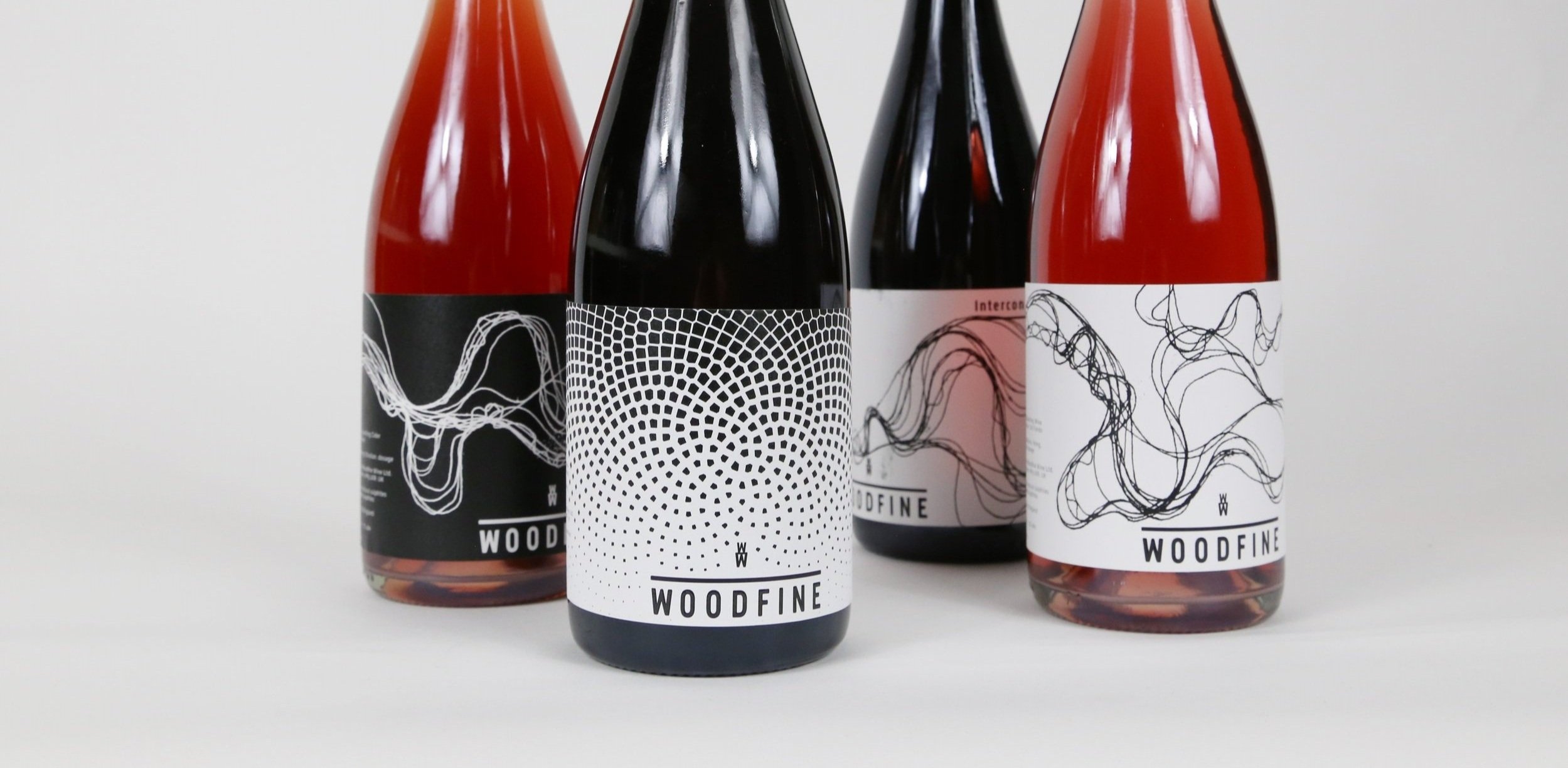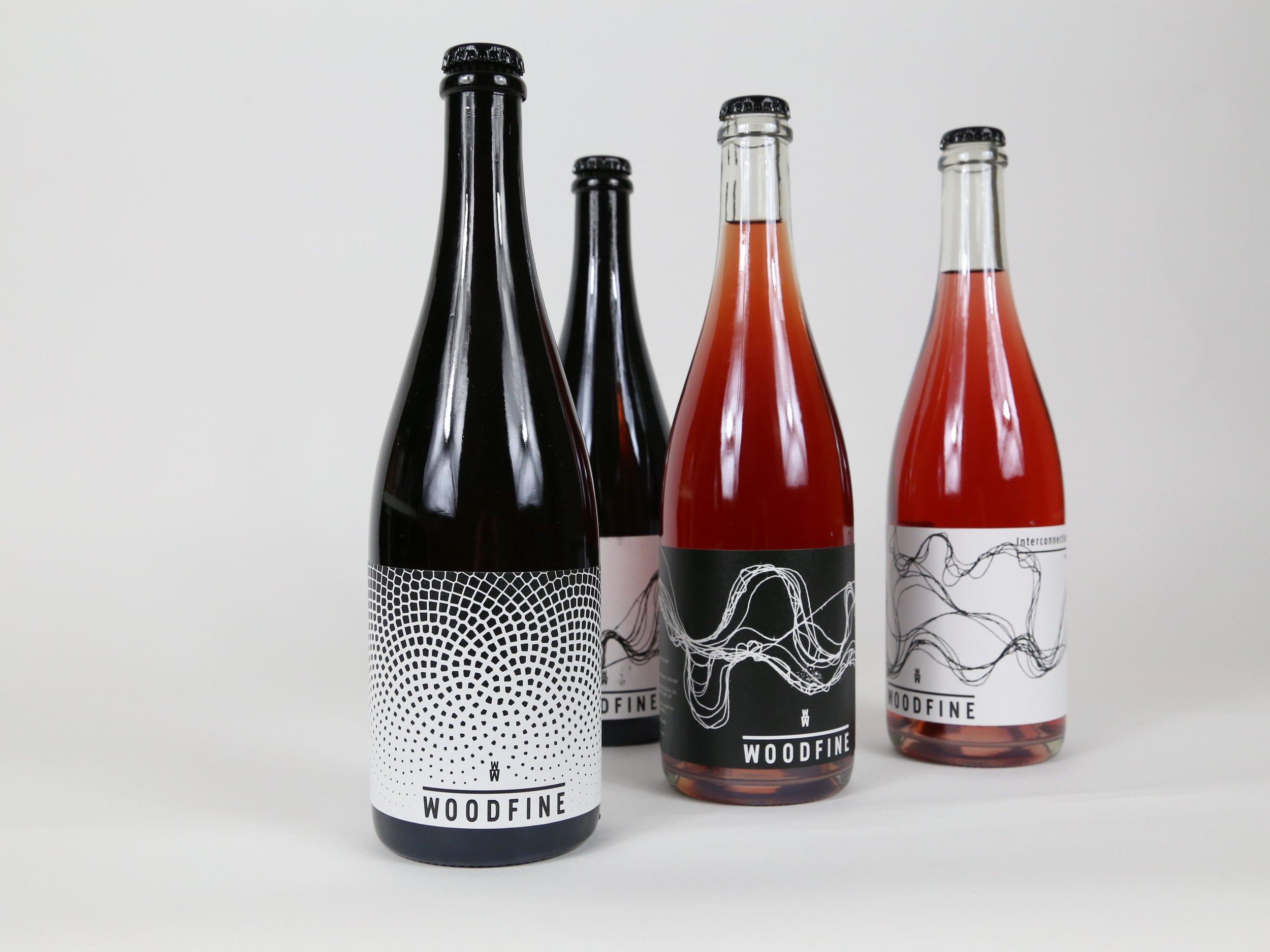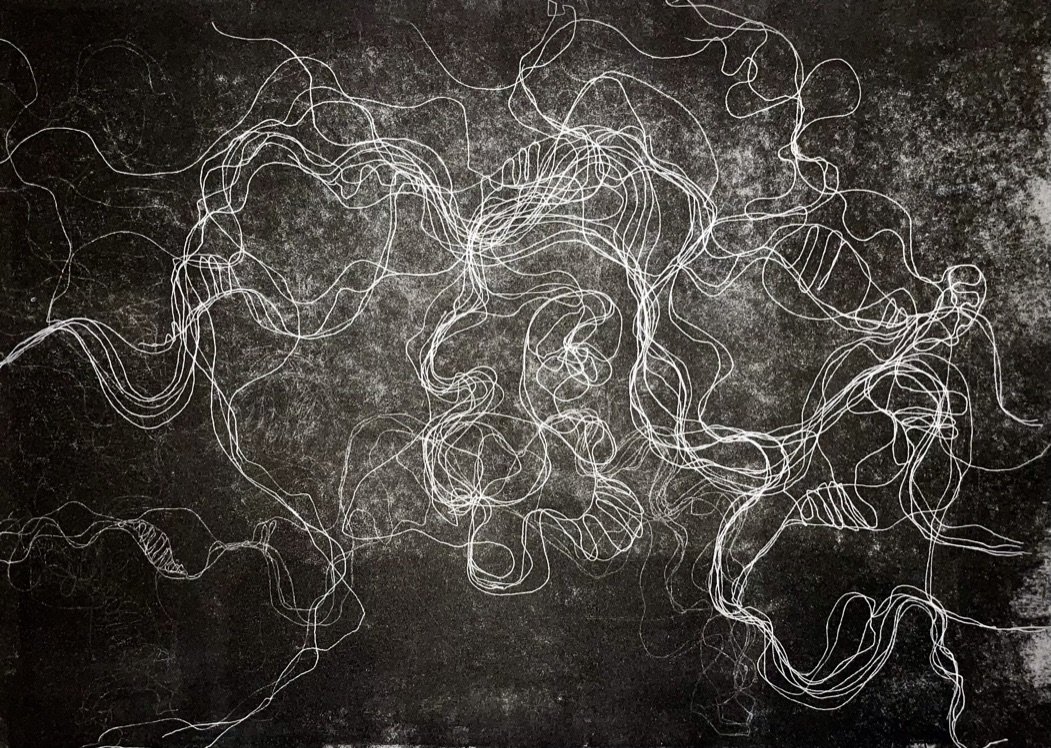
About.
Radically natural English wine made in The Chilterns. Taste the seasons.
-
A truly natural wine involves the least amount of intervention. At Woodfine Wine, we
1. Are Soil Association certified organic on our farm, vineyard and in our winemaking.
2. Use zero additives, filtration or corrective procedures of any kind in our winemaking. Did you know many chemically-engineered wines on the commercial market can contain up to 70 hidden additives that aren’t required to be labelled? We are on a mission to change that.
3. The only ingredient in our wine is grapes, organic wherever possible. Less than 1% of wine produced in the world can say this!
4. We use regenerative agricultural methods to support natural management of the land. Every element of our ecosystem contributes: there are insects, bees and birds among the wildflowers, chickens fertilising the orchard and vineyard and sheep tending to our meadow grasses and flowers.
5. We don’t use heavy machinery, tractors or tilling.
6. We farm according to organic (certified) and biodynamic (uncertified) principles. This includes using biodynamic compost and spray preparations (including dandelion, yarrow, organic essential oils like thyme and eucalyptus and organic whey).
7. Prunings, manure and compost are added back to the land to create a circular system within the farm minimising import and export of materials.
8. We reduce, re-use and recycle wherever possible, including bottles and upcycling of packaging. We only use renewable electricity.
-
Natural wine is a buzz word that can get bandied around from one hipster bar to the next. However, with its roots in seriously rigorous environmental codes and the purest of winemaking techniques, natural wines (and radically natural wines even more so), are the most sustainable wines out there. The less human or chemical intervention, the more natural the wine.
Both organic and biodynamic wines are related to the idea of natural wine, but only a small percentage of those wines can actually be called ‘natural’.
Approximately
7.85% of vineyards are organic
4.5% are biodynamic
1% are ‘natural’
A fraction of that 1% are radically natural (Woodfine Wine)
To be considered a legitimately natural wine you must be making wine in the MOST natural way. Think traditional, small-scale farming. There are many environmental credentials you need to attain – all of which have been achieved by Woodfine Wine.
1. Organic farming (meaning no use of synthetic fertilizers, pesticides or herbicides).
2. Biodynamic farming (means adopting an agricultural approach that sees the farm as a holistic living system, that focuses on biodiversity and set within a natural ecosystem)
3. Natural ‘natty’ wine (meaning minimal intervention in the winery itself – barely any additives, filtration or corrective procedures)
4. Radically natural wine (incorporates all of the practices above, but goes even further by using ZERO additives, including zero sulphite additions, and no fining, filtration or any other corrective procedures)
-
We are passionate about making natural wine that connects nature and community. At Woodfine Wine, these three elements are totally interconnected.
Wine
The environment
Community
We believe it is possible to make the best natural, still and sparkling wines in the world, here in The Chilterns. The climate, elevation, geology, soil and aspect are currently ideal for growing ripe Chardonnay and Pinot Noir grapes, amongst others.
Our low intervention approach draws from ‘ancestral’ and artisanal natural winemaking and farming techniques, including traditional methods to make wines sparkling such as Pét Nat (Pétillant Naturel / Naturally Sparkling) or Col Fondo, or extended skin macerations for still orange wines.
However, making truly natural, wine (with zero additions or industrial-scale processing of any kind) requires constant stewardship and improvement of the natural environment around us. It’s not for the faint-hearted. But we strongly believe that’s the way it must be. And even more so as we look to the future of farming, viticulture and wellbeing.
In a quest to minimise the need for any chemical intervention in the winemaking process, 20% of our vineyard is now planted with PIWI grapes (disease-resistant grapes). These grapes require much less pesticides and herbicides (unlike much of the wine made today) and are the real deal when it comes to low intervention land management. In our case, our PIWI grapes are entirely pesticide- and herbicide-free to date. Watch this space!
What’s in a wine?
Not all wines are created equal. The diagram below illustrates how the number of additives in wines can range from as many as 70+ in conventional wines, to ZERO additives in radically natural wines.
Our Purpose.
Pioneering, regenerative viticulture, with nature and community at its heart.
-
Woodfine Wine is restoring a biodiverse ecosystem and connecting people with nature through ethically made, environmentally conscious, organic farming/vineyard management, and zero addition, natural winemaking.
Our work restores the land, supports our community and is good for people and planet.
-
We make radically natural wine – only organic fruit wherever possible (our farm, vineyard and orchard is certified organic and we work with other partner growers that can be organic-certified or uncertified but following or moving toward organic principles) with zero additions of sulphites, yeast, sugar, fining agents or chemicals of any kind. The only ingredient in our wine is grapes.
We use hand-powered equipment wherever possible, electric where it is not, with the latter running off renewable power supply.
-
Our goal is to make the best natural wine with the lowest environmental impact in the UK – that supports both people and planet.
Alongside growing a variety of organic English grapes and apples on our regenerative farm, we experiment, blend and co-ferment – all with the aim of producing the best, most interesting and most surprising still and sparkling wines and cider. And, as always, our aspiration is to add nothing other than organic fruit wherever possible.

Our Wines.
-
With all of our wines, the juice is left to spontaneously ferment using wild/native yeasts. There are zero additions of sulphites, sugar, fining agents, chemicals. All are bottled by hand with zero disgorgement or dosage.
Natural, English, still and sparkling wine.
-
Interconnections Part 1
Sparkling cider fermented on Pinot Noir and Chardonnay grape skins, part-oaked in barrique. Apple base with high notes of strawberry, wildflower and sherbet.
Interconnections Part 2
Classic sparkling cuvée of Chardonnay and Pinot Noir, oaked in barriques. Raspberry and cherry rounded off with oak to give a rich, structurally complex sparkling wine.
Interconnections Part 3
A pure expression of sparkling Pinot Noir. Light, clean and elegant with notes of strawberry and wildflowers.
Lost Vagus – White
Whole bunches of Chardonnay that underwent full carbonic maceration blended with barrique-aged Chardonnay. Soft, pears drops, exotic fruits and banana…unlike any Chardonnay you will have tasted before.
Lost Vagus – Rosé
A blend of barrel-aged Chardonnay and Pinot Noir. Clean, crisp and light, with strawberry and yoghurt notes, perfect for a warm Summer’s day.
Lost Vagus – Red
Whole bunches of Pinot Noir that underwent full carbonic maceration blended with barrique-aged Pinot Noir. A light red wine that is all red cherry fruit… remarkably gluggable.
-
Our intent is to use the heritage of wild and rare varietal English cider apples to act as a base for a low alcohol alternative to sparkling rosé wine. The base is cider but the sensory experience is unmistakably the summer fruit aromas and flavours of Pinot Noir.
There is an ancient organic orchard at our home, Newbarn Farm. The apples are collected by hand and are complemented with apples from our local community in The Chilterns, including wild apples foraged from the surrounding countryside to add greater structure and tannins. We co-ferment the resulting apple juice with our grape skins to create a majestic combination of the best elements of cider and wine. In its homeland of Italy, this experience is called Vin ed Pom.
The combination of rare apple varieties with the distinctive polyphenols characteristic of Pinot Noir and Chardonnay results in an experience that questions what we know of either cider or wine.
Our Credentials.
-
Les Caves de Pyrene
(The most prestigious and long-standing global distributor of organic/natural wines)The Hand & Flowers
(Two Michelin Star gastropub in Marlow, Buckinghamshire)KOL Restaurant
(Mexican/British dining, London)SILO
(Zero waste dining, London)The Crown at Bray
(Gastropub, Bray, Berkshire)The Oarsman
(Gastropub, Marlow, Buckinghamshire)Sune
(Restaurant, London)Farmyard Wine
(Restaurant and wine bar, St Leonards, Hastings)The Shambles Bar
(Windsor, Berkshire)Cave Bristol
(Wine bar & bistro, Bristol)Tillingham Wines
(Rye, East Sussex)The Sourcing Table
(Wine shop, Peckham)Palate Bottle Shop
(Shoreham-by-Sea)
-
Food & Farming Champion Buckinghamshire, 2024
Real Wine Fair, 2024
UK producer representative at largest natural wine fair in the UK; expert panel for regenerative viticulture.Real Wine In The Vines, 2023
We hosted the largest organic/natural wine fair for UK producers/trade; expert panel for regenerative viticulture. -
Ballymaloe (Global Top 10 Cookery School)
Sustainable Wine programmePlumpton Wine College
Selected as exemplar site for regenerative viticulture for all MSc wine students in the UKSchools
Educational programmes for primary and secondary schools covering farming, food, nature and science.Soil Association
Collaborations with the Soil Association charity on educational programmes, community volunteering programmes and wellbeing events.Nutrition and wellbeing
Collaborations with Dr. Lucy Williamson, Rooted Life, David Jacko Jackson and various other wellbeing practitioners and programmes.Nature recovery on-site
Organic-certification, wildflower meadow reintroduction, orchard recovery and expansion, hedgerow expansion, traditional hay meadow, nesting owls/bats, invertebrate and small mammal recovery, dead wood piles.Nature recovery off-site
A hub for charitable funding, networking and development of ecosystem restoration programmes across the UK through Rebel Restoration and Rebel Nature Works.
Our Art & Labels.
-
Great wine is created in the entanglement of soil, vine, weather and ecosystem.
Curling and flowing across our labels are mycelium threads, the fungal network in the soil that nourishes our vines and keeps this whole system connected – pulsing, communicating.
Our soil, vine, grape and wine quality are all critically-dependent on these fungal networks, and so we believe we need to nourish our soil to enhance the life, ecosystem and products dependent on our land. Each vine in the vineyard and apple tree in the orchard is connected to each other through the fungal networks around their root systems.
The mycelium artwork also represents the inter-connections between all of the elements on our farm that create the circular and regenerative farming system: manure from the chickens feeds the trees and vines, the bees pollinate the apple blossom, the wildflowers feed the bees, the apples are fermented on grape skins.
The final representation is the interconnections between our farm, vineyard and wine business with our community, and with all of our stakeholders (customers, suppliers, volunteers, outlets, etc); a similarly entangled network that is exploratory, self-supporting, resilient and nourishing for those it connects.
Local artist Charlotte Cooper designs and hand-prints our labels. Each label for our first vintage was unique, with its mycelium threads connected to two others as part of a large single tapestry. We love the idea that these bottles went to different homes, creating invisible connections between our customers. And our handsome logo is designed by another local artist, Ellie Good.
-
The vagus nerve connects our gut with our brain and is directly impacted by the foods and drinks that we put into our bodies. Wholesome food and drink grown organically in direct contact with soil, without use of herbicides and inorganic pesticides is better for our gut than highly processed foods and drinks. This ‘interconnects’ the soil with our gut and brain in what is known as the soil-gut-brain axis. Our physical and mental health is directly related to how we look after the land, grow and process our food.
Natural wines are grown with respect to land, plant, animal, human and consumers.
After losing sight of our vagus, we can now reconnect with it by becoming more present, thoughtful and impactful in our consumption choices. When you buy our wine, you invest in us and how we do what we do: better for planet, people and community.
Our artist, Ellie Good, living in Seer Green, wonderfully captured this concept in her artwork that accompanies our Lost Vagus series of still wines.



Our Community.
We aim to spend every pound we can in our local community: our artwork, graphic design, social media, printing and farming support all comes from friends within a one mile radius of the farm.
We connect with our local community through our customers, suppliers, outlets and volunteers. We have volunteers from the local community and societies that help with the chickens, fruit/veg, beekeeping, orchard, vineyard and winemaking. We attend local community events such as fairs, school/church group activities and markets.
In addition to our own wine, cider, honey and eggs, our tastings use charcuterie and organic cheeses made right here in The Chilterns. We take waste organic whey from our cheese supplier and use it as a biodynamic spray preparation for our vines to help us avoid use of inorganic chemicals… interconnecting the land of our two organic farms.
One of our volunteers, Huw, writes poetry in his spare time and penned the below for us after helping for a few months in the orchard, vineyard and with cider-/winemaking. Huw’s poem is a fabulous expression of how our land can connect with, and impact, those that spend time in this place.
Two Orchards
My father planted an orchard.
57 trees, positioned by Pythagoras.
They struggled at first --
The orchard was high and exposed;
Marine winds barrelled through.
He spoke of narrow trunks and weak branches;
Of strengthening stakes and steadying ties.
I nodded politely and asked nothing.
But when the apples arrived
They crowded every branch;
Half-grown trees sagged like willows.
My father meandered a path through the flowered grass
To walk alone amongst his regiment.
And now I pick apples.
Another orchard; another time.
Here too they grow dense as grapes;
Bows bend as if drawn by archers.
There is a tool for this. I set it down. I
want to feel the weighty spheres in my hands
And the vivid strength of stalks before they break.
My hands envelop the smooth green fruit
As his hands, impossibly large and strong
Once wrapped securely around mine.
Every apple picked asks a question.
Why did I not listen? Why did I not meander?
And why, in his army of trees so overwhelmed with life
Huw Jenkin

